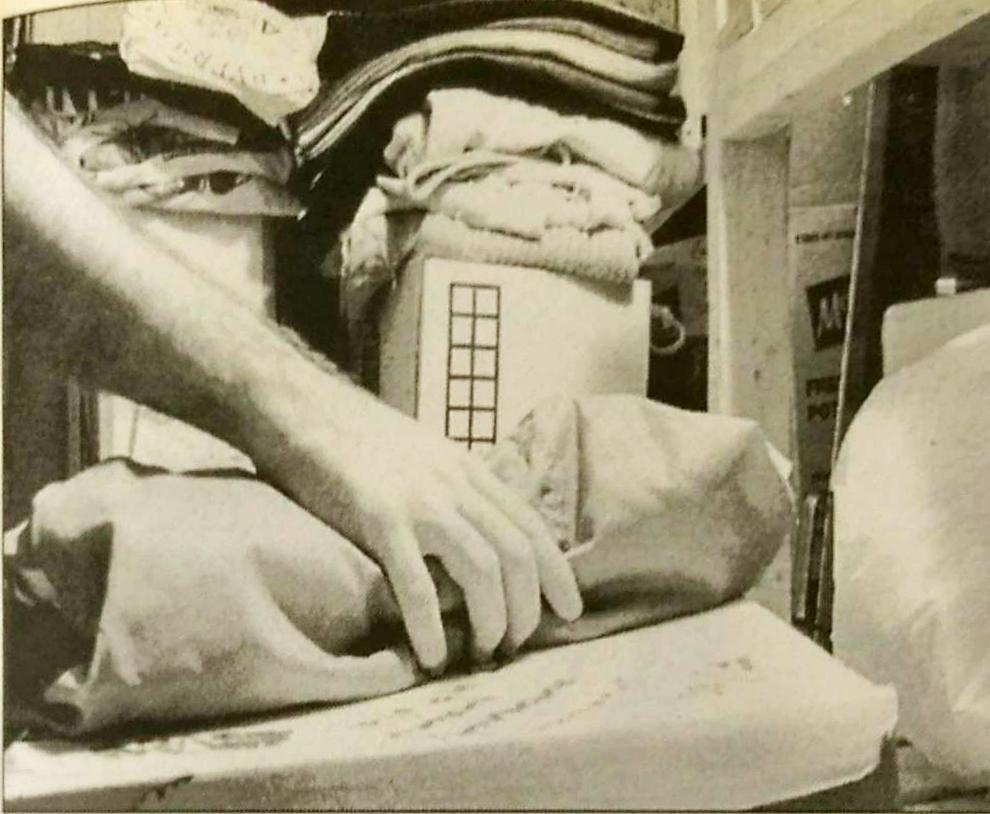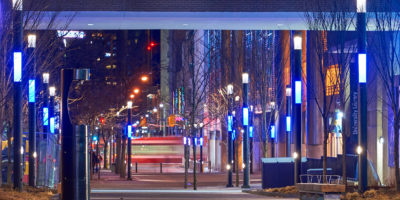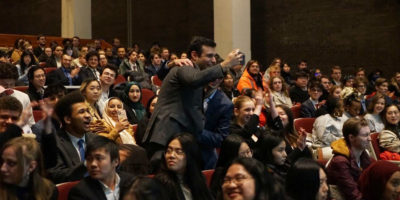By Michael Friscolanti
A large sign hands in Ryerson’s bookstore: “Clothing sale.”
Inside, second-year students Claire Leunissen and Erin Satoor inspect the racks of Ryerson clothing, which include jackets, sweatshirts, T-shirts, shorts and toques.
One of them tries on a coat while the other sifts through the sweaters.
When they realize the sale doesn’t end today, they decide not to buy anything yet. After all, there are many things and questions to consider.
Are the colours right? Can I afford it?
But what about where it was made?
“To be honest, I never really thought about it,” Satoor says, almost apologetically.
“That’s pretty bad, isn’t it?” Leunissen says.
University of Toronto students, however, have thought about it. The university is considering a code of conduct that will include information about locations, wages and, most importantly, working conditions.
Some students have expressed concern that U of T clothing is made in sweatshops: factories where workers toil in unsafe conditions, are intimidated and work long hours for less than a fair wage.
This type of concern is not new.
Sweatshop labour has become an issue across North America and clothing companies have felt the heat of consumers and activists.
Colleges and universities are not feeling the effect. But boycotts, a once dominant way of protesting sweatshop labour, has given way to policies such as U of T’s.
A few U.S. universities, such as Duke and North Carolina, started the trend. Now, more than 200 schools are considering adopting codes of conduct.
In the U.S., branding school names on clothing and other items is a $2.5-billion (U.S.) industry annually. Nike, an industry leader, reported last year that college licensing accounted for 1 per cent of it’s $9.5-billion in sales.
In Canada, the pursuit of sweatshop advocacy is lead by U of T. Supporters want to help improve labour standards by making clothing companies more accountable. The rules would not apply just to specific firms, but to the industry. With so many subcontractors and countries involved in producing clothes, it’s almost impossible to track down each company’s procedures.
“Our code can’t really deal outside out sphere of the business,” says Barbara Dick, who works in marketing and productions for U of T’s alumni association.
Dick, who anticipates the policy will be ratified soon, hopes the code will raise awareness and said that anyone may borrow from the plan.
But is Ryerson in the borrowing mood?
At the Tim Horton’s at the southern tip of campus, students join the lineup of caffeine lovers for their daily fix.
One is Valerie Ree, a fourth-year business student. She sports a navy windbreaker with Ryerson’s logo on the front. She never thought about where her coat came from.
“It’s just not something that ever occured to me,” Ree says.
But she says Ryerson should be aware of the origins of the clothing it sells.
“If I had a retailing company, I would be sure to let my customers know what kind of conditions my clothes were being produced in.”
As director of ancillary services, John Corallo is in charge of the bookstore. He says that although there isn’t yet a policy to deal with sweatshop labour, it is something the university has discussed recently.
“We are in the early stages,” Corallo says, “but we are really waiting to see what U of T does and then try to follow suit.”
When asked about Ryerson’s clothing producers, Corallo says, as far as he knows, “all ours are clean.”
Two of Ryerson’s major suppliers, Dubwear and Russell Athletic, have sent notes to bookstore manager Kelly Abraham. The letters insist that the minimum labour conditions at the firms far exceed those at a sweatshop. Russell Athletic’s letter is a standard pamphlet outlining the company’s commitment to fair labour practices, including safety and basic human rights for worker.
Abraham says the letters are a first step in addressing the problem.
“You have to be competitive, but there has to be a human aspect to everything as well,” he says. “We’re a university and we don’t exploit people.”
But critics are quick to point out that letters aren’t enough.
Sonia Singh, a volunteer for U of T’s Students Against Sweatshops, says any company can make claims, but proving them is harder to do.
“Many industries themselves have codes of conduct, but they essentially fail because the claims are one-sided,” she says. She says the U of T code forces the company to disclose its production process, followed by independently monitoring.
Nike recently release the locations of 41 of its plants world-wide, falling to pressure from major U.S. universities. Although some called the reports a minor effort — wages are not mentioned and only four factories were independently monitored — it is still a precedent for other manufacturers.
Dubwear, whose label appears on T-shirts made in Honduras, appears ready follow.
“Full disclosure wouldn’t be a problem. Nothing we make is sweatshop made, said Leslie Dub, Dubwear account executive. “If the time came where we’d have to fill out the paperwork, we’d fill it out.”
But not all companies welcome disclosure.
Primewear, which produces Ryerson’s “Class of 2000” T-shirts, some of which are made in Mexico, is prepared to open its factories for inspection, but is concerned about disclosing its subcontractors.
“My only problem with such a code of conduct is revealing my sources,” said Primewear president Gary Vaters, who imports clothing. “I would want to see the policy have a ‘no disclosure clause’ that would guarantee that nobody else would see my sources except the university.”
The clause would make sure companies don’t lose a competitive edge by letting competitors know their sources, Vaters says.
Nancy Young of Russell Athletics agrees. She says competition is so cutthroat that a rival would rather buy out another company’s contractor and leave its factory dormant than see it produce clothing lower on cost.
“Full disclosure is a public relations move,” said Young, Russell’s v.p. of communications and community relations. “What does full disclosure really give you if a company doesn’t have a goal of making things right, like we do?”
It’s a Wednesday night at Kerr gym and the men’s basketball team is preparing for the regular season.
Most players are wearing their discount sneakers, compliments of Adidas. A Coke symbol adorns one of the scoreboards. A bottle of PowerAde is for sale in a hallway vending machine.
The core of the sweatshop issue goes further than just the bookstore and clothing manufacturers. It forces the scrutiny of all companies whose logos are plastered around campuses.
For Singh, U of T’s code of conduct would set a precedent and pave the way for a standard for companies to follow.
Gordon Cressy, v.p. of Ryerson’s university advancement office, is responsible for approving on-campus sponsors. He says it’s difficult to develop a policy that judges ethics without first defining what ethics is.
It also forces unfair comparisons between countries with differing standards, he says. What is considered appalling here may be the norm elsewhere.
“Such a policy would ask a lot of questions that would probably not be agreed on by everyone, and would give a lot of open answers,” Cressy says. “But it would at least pose the question, which is good.”










Leave a Reply